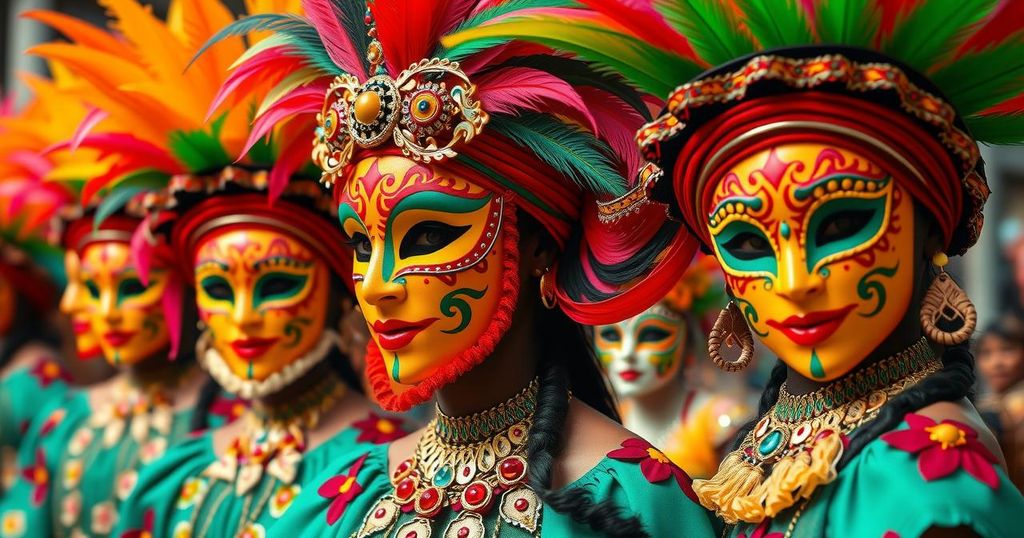The Long Wave discusses Trinidad and Tobago’s carnival as a significant cultural event celebrating African roots. Key themes include the event’s historical context, connections between West African and Caribbean cultures, and the resilience of communities amidst contemporary challenges. With notable performances and geopolitical movements, it signifies an evolving relationship between the two regions, fostering unity and identity.
In our inaugural edition of The Long Wave, I reflected on the necessity of connecting with individuals across the Black diaspora. Recently, I engaged in a conversation with Natricia Duncan, our Caribbean correspondent, regarding the Trinidad and Tobago carnival, a significant cultural event celebrating African heritage.
The carnival in Trinidad and Tobago, promoted as the greatest show on Earth, has roots dating back to the late 1700s. This event symbolizes a rich blend of traditions that emerged as enslaved populations used song, dance, and costume to affirm their folklore and culture, while simultaneously critiquing the wealth and status of plantation owners. It represents resilience and defiance against oppression.
Carnival exemplifies the enduring connections within the diaspora, showcasing West African influence woven through Caribbean music, dance, and cultural rituals. The late Dr. Louis Regis articulated this erasure of African identities, highlighting the urgency of recognizing their contributions, particularly through calypso music, which traces back to West African roots.
This year’s carnival, as reported by Natricia from Port of Spain, displayed remarkable connections to Africa, evidenced by performances from notable artists like Machel Montano and Davido. The similarities in dance between Caribbean and West African traditions reflect a shared ancestral heritage. Minister of Tourism, Culture, and Arts, Randall Mitchell, noted that movements in dance reveal this deep-rooted connection to West African culture, encouraging a more profound understanding of these ties.
Natricia indicated that this cultural resurgence is mirrored in geopolitical movements between African and Caribbean nations. Recent events, such as the African Union summit, underscore a collaborative spirit towards reparations and educational reform that focuses on shared histories. These connections signify an evolving relationship drawing both regions closer.
This remarkable cultural and political alignment seems to mark a new era. Natricia recalled her earlier experiences growing up in St. Vincent, where awareness of Africa was scant, contrasting sharply with today’s increased exposure through social media and cultural exchanges. She highlighted the importance of this transformation in reconnecting the Caribbean and Africa, reminiscent of how Bob Marley and Rastafarianism bridged these communities.
Carnival continues to serve as a platform for resilience amid adversity, particularly in Trinidad and Tobago, where rising crime has recently led to a state of emergency. Despite these challenges, this year’s carnival orchestrated an atmosphere of defiance and joy, enabling people to exhibit their strength and celebrate life. Natricia articulated that carnival remains a crucial space for healing and expression, allowing participants to assert their identity and enjoy the moment despite external pressures.
In conclusion, The Long Wave captures the essence of carnival as a vital cultural and political event fostering connections among individuals of the Black diaspora. As individuals come together to celebrate their shared histories through music and dance, they cultivate a greater understanding and recognition of collective identity within the contemporary landscape. This movement may ultimately inspire future resilience as communities continue to navigate their distinct yet intertwined paths.
In summary, Trinidad and Tobago’s carnival emerges as an essential celebration of African heritage, symbolizing resistance and resilience against historical oppression. This event not only preserves cultural identity but also highlights ongoing connections between Africa and the Caribbean. As participants embrace their roots through music and dance, the carnival fosters unity and understanding among the Black diaspora, paving the way for future collaboration and solidarity across the regions.
Original Source: www.theguardian.com






